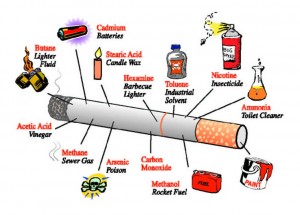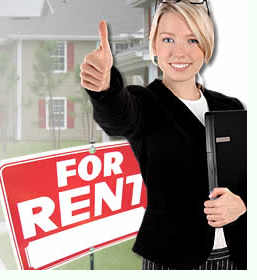Posted by Teresa on December 7, 2012 under Landlord Tips, Legal | 
 The trend in rental properties is definitely swinging toward smoke-free. Tenants are demanding it, an landlords are seeing that the liability and costs associated with smoking inside rental properties makes it difficult to keep allowing it.
The trend in rental properties is definitely swinging toward smoke-free. Tenants are demanding it, an landlords are seeing that the liability and costs associated with smoking inside rental properties makes it difficult to keep allowing it.
Many tenants are sensitive to cigarette smoke. Even if you thoroughly clean the unit, paint, replace carpets and change out the blinds, some tenants will still smell the odor of the previous tenant’s smoke. It just doesn’t make for a pleasant living situation, and you could lose a good tenant over it.
Old cigarette smoke is a health risk, too. Particulates in the exhaled smoke stay around for longer than you might think. They are in the dust floating around in the air; they settle in cracks and crevices; and they set the stage for long-term health problems—particularly for children and individuals with lung or breathing issues, such as asthmatics. New studies show that it’s not just second-hand smoke that is potentially harmful. In other words, you don’t have to directly breathe in someone else’s smoke to be harmed—you could be in a room today that someone smoked in yesterday, and still be affected.
A study a couple of years ago focused on 5,000 children who lived in smoke-free residences, both detached and multi-family. It found that overall, 73% of the children were still exposed to tobacco—but those who lived in apartment buildings had much higher instances of nicotine in their blood (84.5%, compared to 70% of kids in detached homes).
The poisons and chemicals in tobacco smoke linger. They travel down hallways, and through ducting and shared walls. The long-term affects on children and other vulnerable populations are not known now. But do you want to be partly responsible for a child’s future health problems? Turning your rental apartments into smoke-free housing is good for everyone—your current tenants, your future tenants and their children, who are the most innocent victims of other people’s smoking habits.
Posted by Teresa on December 5, 2012 under Landlord Tips | 
 The rental market is hot in many areas, and vacancies are low. Many landlords are seeing more applicants for every vacant rental than they’re used to. When you have multiple tenant applicants, you can be picky about to whom you choose to rent your apartment or single-family rental home. Why rent to a problem tenant, when you have a better choice?
The rental market is hot in many areas, and vacancies are low. Many landlords are seeing more applicants for every vacant rental than they’re used to. When you have multiple tenant applicants, you can be picky about to whom you choose to rent your apartment or single-family rental home. Why rent to a problem tenant, when you have a better choice?
That’s where tenant screening comes in. You don’t have to settle for less than an ideal tenant—choose those with acceptable credit history, no criminal record and enough income to meet your standards.
Here are some dos and don’ts for tenant screening that you may find helpful:
• Do have the applicant pay the tenant screening fee by including it in the application fee.
• Don’t neglect to obtain the applicant’s signature on a separate authorization page.
• Do treat every applicant equally, by screening each one and using the same process. You could be subject to charges of discrimination if you only screen and reject certain applicants.
• Don’t forget that you have the option to check an applicant’s sex offender status, social security number, address, name, and eviction history, along with standard criminal background and credit checks.
• Do check out your screening service. Make sure it has a good reputation, and is a Better Business Bureau Accredited Business. Be sure they comply with the federal Fair Credit Reporting Act and are an FCRA-Compliant Consumer Reporting Agency.
• Don’t share information you learn with anyone.
• Don’t fall victim to any applicant’s hard-luck story. Stick to your procedures and award leases based on ability to pay the rent, acceptable credit and rental history, and clean background check.
• Do advise applicants in writing if you reject them based on credit checks. Provide a copy of the credit report.
• Don’t discriminate against applicants on the basis of family status, national origin, gender, race, religion or disability.
• Do verify employment and income. Require pay stubs, bank statements or income tax returns.
Tenant screening doesn’t have to be an overwhelming process for landlords. Stick to these dos and don’ts and feel free to contact E-Renter with any questions!
Posted by Teresa on November 28, 2012 under Landlord Tips | 
 You may not realize it, but you could be facing competition from an unknown entity. All over the country, scam artists are posing as landlords of buildings they don’t even own and preying on unsuspecting would-be tenants. One elderly woman in Maryland lost $5,000 to con artists.
You may not realize it, but you could be facing competition from an unknown entity. All over the country, scam artists are posing as landlords of buildings they don’t even own and preying on unsuspecting would-be tenants. One elderly woman in Maryland lost $5,000 to con artists.
In a tight rental market, people are more anxious about finding affordable rental housing. Scammers take advantage of their desperation—and willingness to let their guard down—to steal thousands of dollars that victims think is going to pay rent and security deposits. Soon, they discover that the “landlord” to whom they handed over their money is nowhere to be found. Typically, they have little recourse for recovering their funds or getting justice. The phony landlords simply vanish into thin air.
Scammers like this affect everyone. Most tenants have limited funds for rent and security deposits—so, when that money is gone, it won’t be replaced for months. Legitimate landlords miss out on the chance to lease to new tenants, and the victims are left scrambling to secure new housing—or become homeless.
How can this scam happen? Con artists search for homes for sale or rent online, and copy the information and photos to create “For Rent” listings on Craigslist and other websites, using their own contact information. When someone inquires, they say they are relocating and need to immediately rent out their home. If the house is for sale, they tell interested parties to ignore the sign in the front yard—they’ll be taking it down soon. Some even find ways to change the locks on the house so they can show it to unsuspecting victims. Others tell tenants they will get the keys after the security deposit is received.
These con artists are creative and convincing. It might be hard to understand how anyone could fall for a scam like this, but they do. Maybe some of your tenant applicants have fallen for these scams. Or maybe they’re getting ready to. As a responsible landlord, you can help prevent these con artists from getting away with their schemes—and help your future tenants save money so they can rent from you!
First, check Craigslist in your area to see if any of your rental properties are showing up under phony listings. And, when showing your rental properties or talking to applicants, be sure to mention that there are scam artists out there. If they are considering other properties, let them know that they need to do their due diligence:
• If there is a For Sale sign out front, call the agent on the sign and ask if the home is for rent.
• Never mail a security deposit to a random address or PO Box if you haven’t met the landlord and determined that they do indeed own the property.
• Check public records to see who owns the property.
• If the rent seems too good to be true, it probably is.
• If the “landlord” is in a hurry or pushing hard for a rent check or security deposit, something is probably wrong.
Going to a little extra effort could help stop these con artists from victimizing another innocent would-be tenant, so they can rent from you!
Posted by Teresa on November 17, 2012 under Landlord and Tenant FAQs, Landlord Tips | 
 In a multifamily rental property, conflicts can arise over seemingly mundane issues. Parking is one of them. When parking is limited, and tenants are restricted to a certain number of spaces, sparks can fly when they think “their” space is being trespassed upon.
In a multifamily rental property, conflicts can arise over seemingly mundane issues. Parking is one of them. When parking is limited, and tenants are restricted to a certain number of spaces, sparks can fly when they think “their” space is being trespassed upon.
Here are some helpful tips to keep parking disputes from causing big problems for you or your rental property manager:
- When enforcing your parking policy, remember that your tenants don’t own the spot or spots that go with their unit. You do.
- Depending on availability, limit each unit to one or two parking spaces. Leave the rest open for visitors and potential new tenants.
- You can require that a tenant household’s additional vehicles park in visitor spaces or on public streets surrounding the property.
- Don’t allow tenants to “trade” spaces among themselves. For example, if Unit A has one car and two assigned spaces, and Unit B has three cars and two assigned spaces, it might seem reasonable to allow B to use A’s extra space. But this can get complicated. Other tenants will see the three cars and wonder why they are limited to two. When tenant A moves out, the next tenant may need both spaces. People tend to think something “belongs” to them after they use it for a while. And if tenants have disagreements, the parking spots could become a contentious issue. You don’t want to give tenants reasons to disagree.
- Consider having inexpensive decals made for residents to affix to their bumpers, so you can easily identify cars the do and do not belong on your property.
- Be sure to enforce rules against parking in front of dumpsters, along fire lanes and in handicapped spaces. It’s a good idea to give first-time violators a written warning. After that, tow any vehicles that are parked illegally, at the owner’s expense.
- You are entitled to prohibit non-operating vehicles from your property, along with oversize vehicles, recreational vehicles, boats, trailers, etc.
Set clear policies and include them with your lease. Have tenants sign off or initial the page to prove that they have read and understand the policy.
Start your tenant relationship off right by knowing who you’re leasing to. Protect your rental property and assets with tenant background checks. Proper tenant screening will ensure you are leasing to the best possible tenants.
Posted by Teresa on November 14, 2012 under Landlord Tips, Legal | 
 If you’re a new real estate investor—having purchased property to rent out in 2012—you may qualify for special tax breaks on improvements. But you’ll have just a few months to make them.
If you’re a new real estate investor—having purchased property to rent out in 2012—you may qualify for special tax breaks on improvements. But you’ll have just a few months to make them.
Many new landlords jumped into the business this year, as prices dropped and demand rose. Vacancies are down throughout the country, and rents have been projected to stay stable for the next few years. For lots of investors, 2012 was a good year to get into the real estate rental market.
Attracting quality tenants is perhaps the most important thing to learn for new landlords. But what do good tenants want? In most cases, they want to feel comfortable and safe. For higher-end properties, they also want amenities like wood floors, tile bathrooms, gas fireplaces and upgraded appliances.
If you’re a new landlord thinking of making improvements to your property, ask your tax advisor about the IRS Bonus Depreciation of “personal property improvements” and Increased Section 179 Deduction. Briefly, this section of the tax code allows businesses to write off most or all of the purchase price of qualifying equipment and depreciate updates made in the first year of ownership, with certain limitations and restrictions. It was enacted after 9/11 to encourage businesses to invest in themselves.
December 31 2012 is the deadline; new landlords could qualify for breaks on improvements if they move fast. Some improvements, such as cabinets or new tubs, don’t qualify because they are part of the property. But new appliances, floor coverings, fixtures and paint could qualify—and could help you compete for the best tenants.
Of course, it’s always wise to consult a tax expert BEFORE spending any money that you think you’ll be able to deduct as an expense or depreciate.
Disclaimer:
The contents of this article are intended for general information purposes only, and should not be relied upon as a substitute for obtaining financial or tax advice applicable to your situation. Please consult your tax advisor.
Posted by Teresa on October 30, 2012 under Landlord Tips, Lease and Rental Agreements, Legal | 

Landlords and property managers have the right to enter their properties, with proper notice to their tenants. Whether it’s for routine maintenance work, pest treatments or safety inspections, it’s not only necessary to occasionally enter a tenant’s unit, but it’s a good idea to do so. You need to know what’s going on in your properties.
During these routine inspections, landlords and property managers sometimes see things that tenants don’t intend for you to see, such as:
- Ashtrays, cigarette butts and lighters.
- Pet supplies, like food dishes and litter boxes.
- Drug paraphernalia like pipes, lighters and syringes.
- Illegal drugs, such as marijuana or cocaine.
- Evidence of drug manufacturing.
- Signs of a business being run out of the unit.
What can (and should) you do when this happens? Can you evict the tenant? If the occupant is otherwise a good tenant, should you ignore it? First, it’s always important to be familiar with your state’s laws regarding grounds for eviction. But if any of the activity you have witnessed violates the terms of your lease, you probably do have grounds for eviction.
If you’d rather not go that route, then it’s possible to wait until lease renewal time comes around, and inform the tenant that the lease will not be renewed. Of course, you’ll need to provide proper notice, according to the terms of the lease.
Reasons to Consider Eviction or Non-Renewal of a Lease
- Liability: Landlords can be liable for criminal activity that occurs on their properties—even if they are not aware of it. Landlords can be liable for injuries that occur as a result of illegal activity. Landlords can be liable for injuries caused by a tenant’s pet—even if they are not aware of the pet. Laws vary from state to state, but why take chances?
- Health: Smoking in units where it is not allowed can affect other residents, including children. Second-hand smoke carries chemicals and carcinogens through vents, doorways and windows. In addition, cigarettes are the cause of accidental fires.
- Safety: Each year, almost 1,000 smokers and non-smokers are killed in fires caused by cigarettes and other smoking materials.
- Fairness: If most tenants follow your rules, such as not running a business out of the rental unit, it’s not fair to make exceptions for someone who ignores the lease. Charges of discrimination could follow.
Strict and equitable enforcement of rental agreements should be every landlord and property manager’s practice. If tenants are conducting illegal or criminal activities or are breaking the terms of their leases, your best move is to get them out and replace them with tenants who will follow the rules and abide by the lease.
And if you need to, amend your lease agreement to include a paragraph prohibiting drugs and other illegal activities on your property.
Start your tenant relationship off right by knowing who you’re leasing to. Protect your rental property and assets with tenant background checks. Proper tenant screening will ensure you are leasing to the best possible tenants.
Posted by Teresa on October 25, 2012 under Landlord Tips | 
 Crime happens—even in the nicest apartment complexes and neighborhoods. Despite landlords’ and property managers’ efforts to deter criminal activity, tenants can still become victims of random or targeted crimes.
Crime happens—even in the nicest apartment complexes and neighborhoods. Despite landlords’ and property managers’ efforts to deter criminal activity, tenants can still become victims of random or targeted crimes.
So, what should you do if a crime does occur on or near your property? Is it your obligation to disclose the information to tenants?
Recently, a tenant was robbed at gunpoint at a normally quiet Seattle apartment complex. The property manager did not alert other tenants to the robbery. When word got around, many tenants were concerned about the lack of communication. “It’s not right,” said one tenant. “I need to know if there’s an increased risk, so I can be more aware and warn my daughter to be more careful, as well.”
It’s not illegal for landlords to withhold information about crimes on or near their properties. But many, like a landlord friend who owns several four-plexes, choose to inform tenants. Mike shared his experience: “Unfortunately, one of my tenants was mugged. The guy took her purse, but thankfully didn’t hurt her,” he said. “I personally informed each of my tenants about the incident, and asked them to be alert and call the police if they saw anyone suspicious in the area.”
Mike says it’s always better to have more communication with tenants than less; he also feels responsible for his tenants’ safety, to the best of his ability. “I think my tenants would rather hear from me about incidents like this, rather then from rumors or reading it in the news.”
Chances are, your tenants are going to hear about crimes in their neighborhoods. Police will generally share this information with property owners and managers, and the victim will often tell friends and family. Disclosing this information when you have it builds trust and encourages open communication between you and your tenants. After all, why should tenants tell you about criminal activity if you don’t tell them? There is really no downside to full disclosure!
Posted by Teresa on October 23, 2012 under Landlord Tips | 
 Perhaps you’re a new rental property owner, and you’re not sure how to go about managing your property. Or maybe you’re a successful landlord who is thinking about turning over the day-to-day management of your properties to a professional company. Perhaps you’ll even take it easy and enjoy some free time again.
Perhaps you’re a new rental property owner, and you’re not sure how to go about managing your property. Or maybe you’re a successful landlord who is thinking about turning over the day-to-day management of your properties to a professional company. Perhaps you’ll even take it easy and enjoy some free time again.
Whichever the case may be, hiring a property management company has its upsides—like no more tenant phone calls in the middle of the night. It also has its downsides. For example, no company will care for your property like you do.
Before you decide whether or not to hire a management company, here are some additional pros and cons to consider.
Pros and Cons of Hiring a Property Management Company
Property management companies are professionals and are experienced. Here are considerations that make it worth hiring one:
- You’ll spend less time working on (and worrying about) your rental properties.
- You’ll save travel time going to and from your properties.
- You will have the peace of mind that comes with not dealing directly with tenants for rent collection, complaints and other issues.
- Someone else will handle maintenance and repairs.
- They will determine the best rent, based on the market and what your property offers.
- A quality PM company will find the most qualified tenants.
- They have connections with lawn, snow removal and maintenance and other service companies, and can often procure services at better rates.
On the other hand, property management companies cost money, so before you hire one, take the following into consideration:
- You won’t have the advantages of hands-on, do-it-yourself management, such as seeing for yourself how things are going at your properties.
- You may not need all of the services provided by property management companies. For example, if your property doesn’t require a great deal of upkeep, you could be overpaying.
- A property management company may not feel as compelled as you would to keep your vacancies low.
- You will have to manage the property management company. This could take substantial time and effort.
- Do you have the extra cash every month to pay 8–10% of your income to a PM company?
For some landlords, hiring a property management company is an unnecessary expense. For others, the additional free time and decrease in stress makes it worth every penny.
What do you think? Do you prefer to manage your own properties or was hiring a professional company the best decision for you?
Posted by Teresa on October 17, 2012 under Housing Trends, Landlord Tips | 
 What do tenants want? What is the competition offering? These are two questions that every landlord should be able to answer. As in any business, it’s imperative to know what your customers’ needs are, what they prefer, and why they’re buying from the competition. In the landlord business, providing tenants with the amenities and features that the want, can keep them from going to the competition.
What do tenants want? What is the competition offering? These are two questions that every landlord should be able to answer. As in any business, it’s imperative to know what your customers’ needs are, what they prefer, and why they’re buying from the competition. In the landlord business, providing tenants with the amenities and features that the want, can keep them from going to the competition.
If you want quality tenants who stick around and renew their leases, then consider the following upgrades, which most tenants love:
Washers and dryers: Stackable units are made for small spaces. For not a ton of money, you could add a washer and dryer to a utility closet. Or install full-size appliances on a back porch or basement of a single-family unit or duplex. Tenants love not having to go to the Laundromat.
Wood floors: Most landlords cringe at the thought of installing easily-scratched wood floors, but there are new materials that look just as good and are super tough. Laminate flooring is perfect for rentals, is very dependable and easy to maintain.
Fenced yards: Your pet-loving tenants will especially appreciate a fenced-in yard. So will those with kids they’d like to keep an eye on. And everyone likes the privacy factor.
Storage: Most tenants will never complain about too much storage. Whether it’s bigger closets, built-in bookcases, shelves in the kitchen and bathrooms or an outdoor shed, you can’t go wrong adding a little extra storage.
Updated fixtures: Old, outdated lighting fixtures can be depressing. It doesn’t take much time or money to install new ceiling light fixtures, as well as new lighting in the kitchen and bathroom. While you’re at it, put in a fluorescent under-cabinet kitchen light to brighten the room.
Patios: Most everyone loves to be outside when the weather permits. Even a small concrete pad or flagstone patio can pay for itself when prospective tenants see it.
It’s always a good idea to shop around and see what comparable rental units have to offer, as well as what they are renting for. If you’re having trouble attracting or keeping good tenants, consider upgrading your units to give them what they want!
Start your tenant relationship off right by knowing who you’re leasing to. Protect your rental property and assets with tenant background checks. Proper tenant screening will ensure you are leasing to the best possible tenants.
Posted by Teresa on October 12, 2012 under Landlord Tips, Lease and Rental Agreements | 
 If you own a property and aren’t interested in renting it out for the long term, there are plenty of potential shorter-term tenants that could be a good fit for your needs.
If you own a property and aren’t interested in renting it out for the long term, there are plenty of potential shorter-term tenants that could be a good fit for your needs.
Consider the following:
- Older people who are retiring and want to rent in an area for a few months before deciding where to live.
- Professionals who fell victim to the housing bubble and lost their houses. Many of these people took a hit to their credit, and need to rent until they can get their finances back in order.
- Career-changers who have moved to an area for a new job and wish to buy, but need short-term housing while they look for a house.
- People who are downsizing or upsizing and have recently sold a house, but haven’t found a new one that works.
- People in transition—whether it’s because of a divorce, illness, death of a spouse or something else. They may not be in a position to make a long-term commitment, but a three- or six-month lease works.
- Adult children of elderly parents who need to live nearby to care for them on a temporary basis.
Certainly, most landlords prefer to have long-term tenants to keep wear and tear down and decrease the hassles of finding new tenants. But if you have a rental property that’s empty, that you may be selling, or that you might move into yourself, there are good tenants out there who need a short-term lease.
With the right kind of homework and some advertising, you can find short-term tenants. Take a look at Craigslist’s “housing wanted” section. And post your listing in the “sublets and temporary” section, with a prominent “short-term welcome” in the heading. Try posting flyers in nearby coffee shops, co-ops and grocery stores.
Be sure to conduct tenant screening on all applicants. Even though the lease is only for the short term, you still need to be sure that your tenant is who they say they are, have adequate credit and income to cover rent and no criminal activity in their backgrounds that could pose a threat.
 The trend in rental properties is definitely swinging toward smoke-free. Tenants are demanding it, an landlords are seeing that the liability and costs associated with smoking inside rental properties makes it difficult to keep allowing it.
The trend in rental properties is definitely swinging toward smoke-free. Tenants are demanding it, an landlords are seeing that the liability and costs associated with smoking inside rental properties makes it difficult to keep allowing it.








